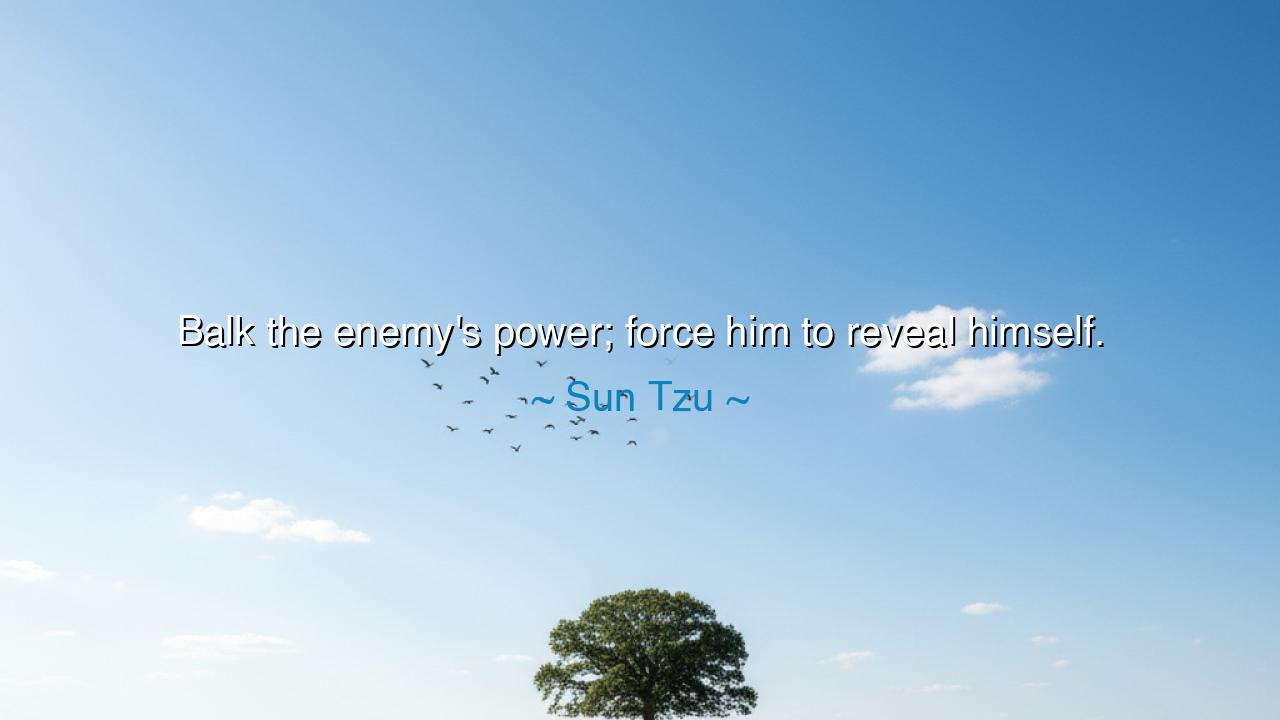
Balk the enemy's power; force him to reveal himself.






Hearken, O children of the ages, to the timeless wisdom of Sun Tzu, the master strategist of the ancient world. He proclaims, “Balk the enemy’s power; force him to reveal himself.” In these words lies a lesson of profound depth: victory is not always achieved through direct confrontation, but through patience, cunning, and the art of unveiling what is hidden. The wise warrior does not strike blindly but compels his adversary to expose his intentions, his weaknesses, and the true extent of his power.
To balk the enemy’s power is to disrupt his plans before they can bear fruit. It is to sow confusion in his ranks, to break his rhythm, and to erode his confidence. By denying him the freedom to act as he desires, you weaken his strength without drawing your own sword. This is the essence of subtle warfare, where the greatest victories are won through preparation and foresight rather than brute force.
History offers many shining examples of this truth. In the Battle of Austerlitz, Napoleon Bonaparte feigned weakness, appearing vulnerable so that his enemies would commit their forces prematurely. In doing so, he forced them to reveal themselves, exposing their true positions and intentions. Once their strength was laid bare, Napoleon struck decisively, achieving one of the most brilliant victories in military history. Like Sun Tzu’s teaching, his triumph came not from reckless attack, but from understanding the enemy through deliberate deception and control.
This wisdom extends beyond the battlefield. In politics, business, and even personal struggles, the principle holds firm. By observing calmly and patiently, one may discern the hidden motives of rivals. To provoke action without revealing your own hand is to seize control of the situation. When the other reveals himself, his vulnerabilities are brought to light, and the path to victory becomes clear.
O children of the future, carry this teaching in your hearts: do not rush to act without understanding. Balk the power of those who would harm you by thwarting their plans and unsettling their confidence. Force them to reveal themselves, for knowledge is the sharpest blade. In the dance of conflict, the unseen mind triumphs over the visible hand, and the greatest warrior is he who wins without fighting.
Thus Sun Tzu’s words echo through the ages, reminding us that true strength lies not only in might, but in insight, patience, and the mastery of perception.






AVNguyen Ai Vy
Sun Tzu’s words make me think about the broader principle of using leverage to gain clarity. If you can make an adversary reveal their capabilities, you gain knowledge without exposing yourself unnecessarily. I wonder how often in history such strategies succeeded versus backfired. Could this method be applied in day-to-day problem-solving or competitive scenarios where subtlety matters more than aggression? I’m also curious whether there’s a risk of overmanipulation leading to mistrust or escalation.
A802. Thuy An 8/8
This prompts me to consider the psychological aspects of strategy. Forcing an opponent to reveal themselves requires insight, timing, and restraint. I’m curious how one can develop the skill to anticipate reactions accurately. Does Sun Tzu imply that understanding human nature is as important as understanding military logistics? I’d like a perspective on modern applications, perhaps in leadership, negotiations, or even diplomacy, where revealing intentions without direct conflict can determine success or failure.
BNBao Ngoc
I find this statement both intriguing and somewhat unsettling. It seems to suggest manipulating circumstances to expose vulnerabilities. I wonder how one balances the need for such tactics with fairness or ethics. Could this approach be misapplied to exploit others beyond military or competitive situations? I’d like to explore the idea of indirect confrontation and whether understanding someone’s true strength is always justified when it involves creating tension or deception.
HDHuyen Do
This quote makes me reflect on the importance of intelligence and observation in strategy. By ‘balking’ the enemy’s power, one creates situations where hidden intentions become visible. I’m curious whether this principle is more about defense or offense. Does it suggest that restraint and controlled provocations can be more effective than immediate action? How might this strategy translate to competitive environments where transparency is limited but outcomes are high-stakes?
HPHoang Pham
Reading this, I’m struck by the strategic subtlety implied here. It seems Sun Tzu is emphasizing patience and manipulation over brute force. I wonder how this principle can be applied outside of warfare—could it work in business negotiations or personal conflicts? Forcing someone to reveal their true position without direct confrontation feels psychologically complex. I’d like a perspective on the ethical considerations of using such tactics in modern contexts.